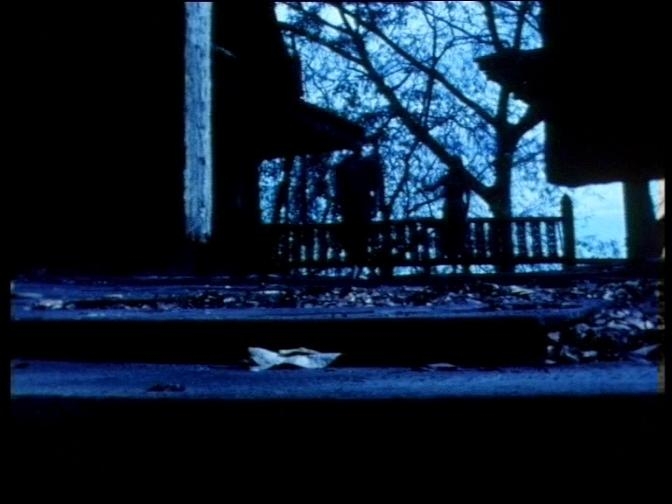Pimpaka Towira & Davy Chou in conversation
Our Objectifs Film Club in Sep 2020 featured filmmakers Davy Chou (Cambodia / France) and Pimpaka Towira (Thailand) in conversation on zoom. The filmmakers spoke about their respective early works, Davy Chou’s First Film and Mae Nak, their beginnings as filmmakers and their journeys since, with Senior Manager Leong Puiyee from Objectifs. The following conversation has been edited for clarity and brevity.
Davy Chou: Davy Chou’s First Film was my first short film, shot in 2006, finished in 2007. I’ve never discussed this film publicly ever in my life. I didn’t know anything about film festivals then. I shot it in Paris, where I was then. It was hardly screened. I have good memories of a few public screenings in theatres where the audience was just shouting, disgusted when they watch the film, and that was pretty much all and after, I never had the chance to explain my concept behind it.
Pimpaka Towira: I made Mae Nak in 1997. It was part of an experimental film workshop conducted by the Goethe-Institute in Thailand. I didn’t know about film festivals or the community, and there wasn’t much of a short film scene. I studied film in university. After I graduated, I didn’t know what to do. I wanted to further my career as a filmmaker but the industry was not so developed at that time, and the kind of films that I was making was not really common. We didn’t have any options to for advanced filmmaking especially for a female, independent filmmaker. You had to go commercial if you wanted to make a film. The workshop came at a time for me to further my career as a filmmaker.
At that point I thought that might be the only chance in my life to make a film. I was broken hearted from studying film at university, so I put my heart and my energy into making it. Looking back now, the spirit’s strong in it, because I thought it would be the last film I would make, but there are some things I wish I could have done differently. Filmmakers feel that way. When you finish your film, you look back, you might regret something that you did.

Leong Puiyee: How do you feel your filmmaking journeys have evolved, from making your earlier films up to where you are now?
Davy: I started making short films at age 17 collectively with people my age in my high school. So this was not exactly my first film, but the first film that I was doing on my own. I had been developing a script for over a year, but was feeling very stuck. It was an abstract and theoretical idea, a self-reflection about how as a cinephile, it’s hard to feel the legitimacy and courage to make films because we feel the pressure of the masters of filmmaking that we love. I was young and wondered if I could be arrogant or confident enough to make steps in filmmaking, under the long shadow of all these film geniuses. So it was not really a film, but some kind of intellectual essay about not being able to make a film. My friends were starting to make their own films, and I felt the pressure.
I was saved when I watched Irma Vep, by French director Olivier Assayas. The film is super theoretical; it’s the story of a director who wants to remake an old film series Les Vampires by Louis Feuillade. For the remake, he brought Maggie Cheung, the Hong Kong actress to be the main character, and Jean-Pierre Léaud, a key actor from the French New Wave to play the director in the film. It was a symbol of French New Wave meets Hong Kong action film. In the film, the director was lost and going through a crisis. He begins to understand what he is trying to do. I felt that the film was talking to me.
Suddenly, I had this vision of my film, which is a guy with a lot of pimples on his face, destroying them one by one in front of the mirror. I don’t know why, but this idea just felt right. That’s the same film I tried to make for one year, talking about influences, trying to make your own way. It was not full of text, full of symbols, but it was at least horrific and action-based. The audience should feel and react to the film while watching it. I felt like I found my way on how to make my first film.
I don’t think of the film much now, but I understood that it was important for me then… making the link in a film that had little dialogue, with cinephilia, with cinema history. That was also the case for my first documentary, Golden Slumbers, about the golden age of Cambodian cinema.
Pimpaka: I was quite upset with how females were portrayed in cinema in our Thai society. This was why I was interested in depicting the story of Mae Nak Phra Khanong, which is a well-known Thai ghost story. There have been more than 20 versions depicting this folklore in Thai films and television. I was thinking about why this folklore exists in our society, and about our knowledge behind this story. I wanted to portray it from the female perspective; there were no female directors who had reinterpreted the story then.
The story is about a woman (Mae Nak) who dies in childbirth while waiting for her husband to return from the war. Her husband eventually came back, and found her and the child waiting for him, but he did not realise that she was a ghost. Her love for him was so strong that he could see her. But in the end, the villagers and her husband got rid of her. I wanted to deconstruct the story, by starting the story from her death. I wanted to portray a woman resisting death, who refuses to become a ghost.
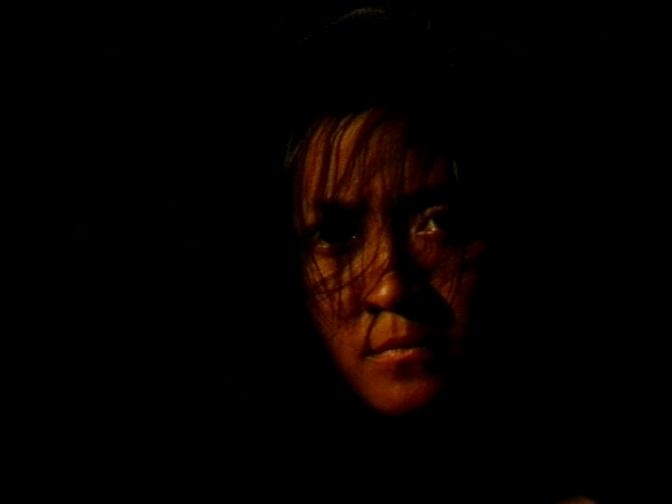
Film Still from Mae Nak
My film is quite different from the previous versions of Mae Nak. So when it was first screened in Thailand, there were strong reactions from the audience. Most of them have their own preconceptions about what a film like Mae Nak should be and they did not expect something like my film. They reacted angrily to my film. Honestly I almost cried back then!
Everyone in the theatre wanted to say something about my film. They questioned about the slow pace, as they expected to see something similar that was made before. It was so upsetting, I felt it was the end of my career. I was young and thought that I should stop making films.
Ironically, the film was then screened in Japan at a film festival. It was a new experience for me and it won an award. Back in Thailand, people wanted me to be a part of the film industry because my film won an award.
In a way, Mae Nak is a paradox for me because it is the film that I thought would end my career, but it is also the film that helped me embark on my first feature, One Night Husband. I suspect that the people from the feature film production company did not watch my short film. Since it had won an award, they probably thought it would work out!
In a way, going through this not only set my path on being an independent filmmaker, but also in becoming myself.
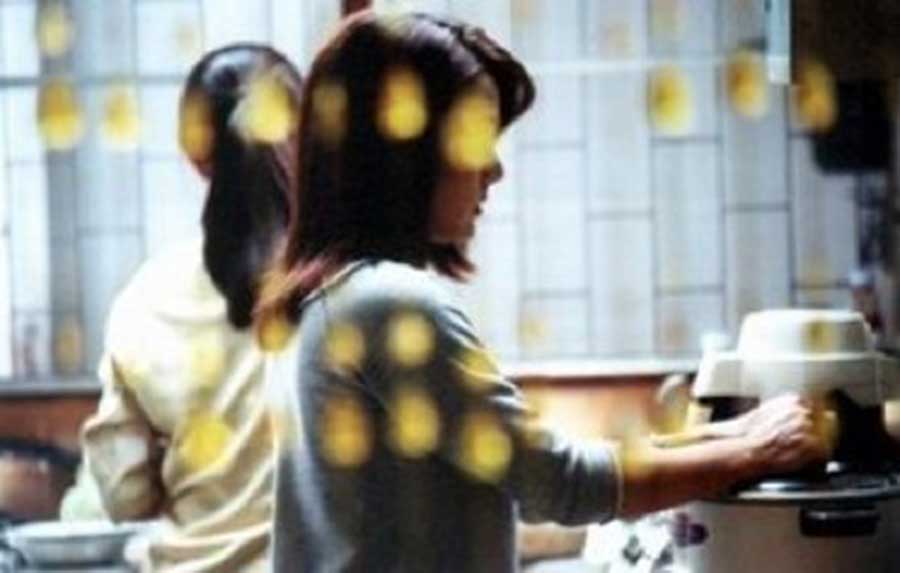
Film Still from One Night Husband
Puiyee: Both of your films deal with horror in a way. When you think about horror, there are many like approaches, like physical horror, spirits. Your films have different types of unease, tensions, and they can be quite uncomfortable to watch. Was there any intention to get audience to think about certain issues or themes when you were creating them?
Davy: I don’t think horror films influenced me when I was making my film, as I don’t tend to watch them and they’re not really to my liking. My film is actually full of direct references to the history of cinema, but none of them deal with horror. There were elements of confrontation, with strong and violent images. I think part of it was provocative for me: to show them, because we don’t usually to see that on screen.
When I screened my film in the theatres, I expected people to be shocked, but I didn’t expect that they would feel disgusted. People reacted extremely violently while watching my film, they were shouting, some closed their eyes, some felt like they wanted to vomit. It was very surprising to me to witness such a reaction, I was naive and didn’t expect it. At the same time, I was happy to see the reactions even though I wasn’t aiming for them.
So I think the play with horror, which is the play of what you’re going to show or not, was really a mise-en-scene question for me… that was how to film that action, which camera angles to use? I thought of those and played with those elements.
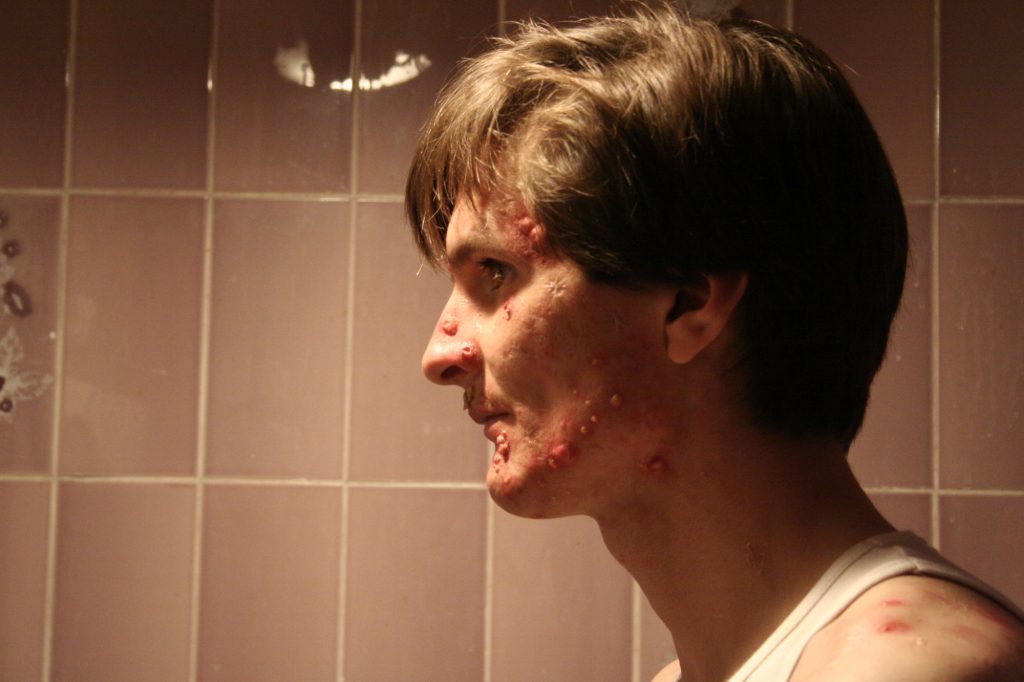
Film still from Davy Chou’s First Film
Pimpaka: Actually I do not enjoy watching horror films because they scare me! Most of my films deal with mysterious elements and perhaps there are some scary aspects in them. I’m not sure why, perhaps it’s an instinct.
For Mae Nak, I deconstructed the notion of a Thai horror film, so I didn’t use anything that looks spooky or creepy. I wanted to interpret the movement of the protagonist through the use of lighting, sound and shadows to give the sense of horror. I was trying to do things differently, and yet give the sense of what horror can be or feel. The Japanese audience could relate to Mae Nak, as it is somewhat similar to Japanese horror films. A few years later when I showed Mae Nak in Thailand again, an audience member told me that he felt afraid after watching my film.
Davy: For my film, I cannot deny there are horrific elements, the confrontation of visual and graphic violence, such as the blood and the self-mutilation of the main character.
I had the intuition to do that and that’s what I wanted to film. Sometimes you have this image, and you want to show it to people.
Maybe there is a feeling inside you that makes you want to share that vision, including visions of violence. I guess nobody can catch the hidden topic in my film but it is so clear in my mind. Dealing with the question of the impossibility of creating without influences, to be able to feel liberated, we need to destroy something or to take something out of ourselves to really be ourselves. Maybe it’s psychological, but it was this idea of a natural violence to his own self to explode something, so that he could liberate himself.
Puiyee: Davy, the first time I watched your film, Martin Scorsese’s short film The Big Shave came to mind. The setting and scenario of that film had similar elements to your film. Were you trying to explore similar themes in your film?
Davy: My film is a direct variation around The Big Shave. At that time, Martin Scorsese was my idol. I was reading all the books I could about his work. I was fantasizing about this film because it was a very famous short film, and sent shockwaves when Scorsese made that film.
As a film lover, you always dream of films. I don’t have an explanation of how, but it just made sense to make this film about my difficulty to make a first film, and to call it Davy Chou’s First Film as a provocative statement that it’s my first film. But at the end, it was a variation of something and I didn’t come up with anything novel. There are these theoretical ideas that I was playing with, or I was having difficulties with and challenges dealing with them. My film is a remake, and it’s also my first film. I tried to do something but at the same time, you always copy others.
If that director is your idol, any idea that you can have is just a copy of the film that you have watched. How do you deal with that? It was logical for me to bring that influence, including in the structure of the film.
Puiyee: Pimpaka, you mentioned that there have been many interpretations of Mae Nak. What are the other versions like?
Pimpaka: Most of the versions of Mae Nak prior to my film were horror films; Mae-Nak is always portrayed as a scary female. There is this belief in the Thai film industry – if you make a film about Mae Nak Phra Khanong, you will either become rich or successful. But I’m not rich or successful!
There are well-known and successful versions: Nonzee Nimibutr’s Nang Nak (1999) focused on the love story of Mae Nak, and there is 2013 comedic version, Pee Mak. Any adaptation of the folklore will be popular, as it is a tale that is part of our society and Thai audiences know the story well. There is even a Mae Nak shrine in Thailand, which shows that she is part of our society and culture. Portraying a woman as a ghost does not mean that you have to be afraid of women.
Davy: I really loved Mae Nak. I thought of the American experimental director Kenneth Anger when I watched it. Did his works influence you then, or it was something that you thought of when you were making your film?
I felt that Mae Nak is like a ritual. The film somehow talks about a ritual, but we also look at the film itself as a ritual. There is a belief that the director feels that the film itself will have a kind of magic power in making the spirit come alive, something that will become real fear, not just the illusion of it. The film had this kind of impact for me. Was this something that you were experimenting with?
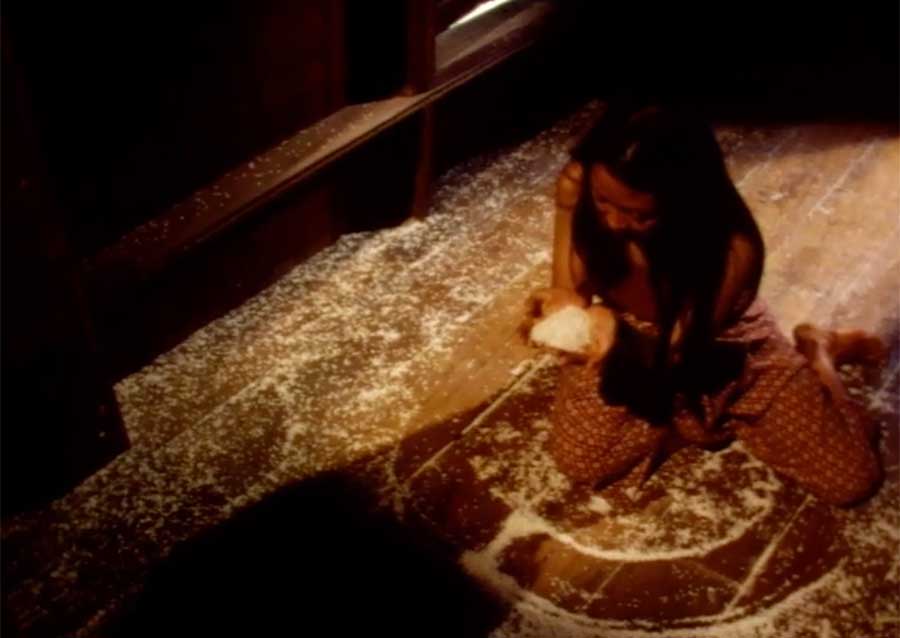
Film still from Mae Nak
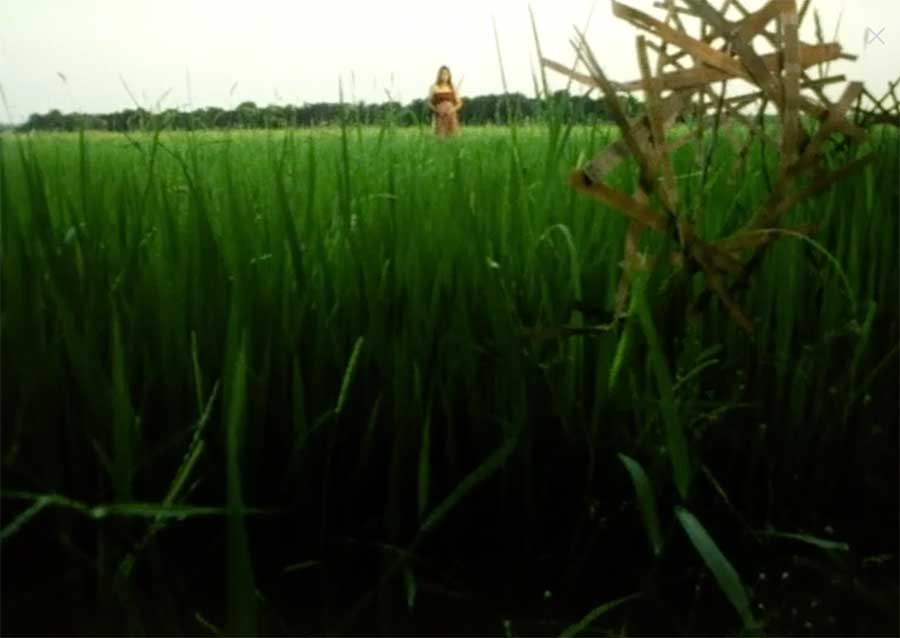
Film still from Mae Nak
Pimpaka: Yes, I was experimenting with the idea of a ritual. The experimental films that have impacted me were works by Maya Deren. Her works influenced me during that time. I made the film as a ritual. In the story, a ritual was also used to get rid of the ghost.
I wanted to try and interpret the element of rituals in our society. For example, in the scene with rice scene in the film, Thais believe that we can get rid ghosts by throwing rice. I wanted to use rice as a kind of celebration for Mae Nak to be reborn again. I wanted that scene to be about a celebration of her life.
Puiyee: Davy, your film starts off with a voiceover of a film, it transitions to slow music and then the music of the Mamas and the Papas comes on. Could you speak more about the sound design and music in your film?
Davy: I played a lot with the soundtrack to bring up the secret themes of the film, which is this reflection about influences. At the beginning, there is a sound extract of films that had been important to me in the creation of my cinephilia. These shots were made as some kind of ghost replicates, of shots from films that I really like to build the story.
The first soundtrack we hear is a famous dialogue between Robert De Niro and Al Pacino in the film Heat by Michael Mann from 1995. I watched this film every week when I was a teenager, and it was a really important film to me. Then there is Stalker by Andrei Tarkovsky, followed by a pop song from Jackie Brown by Quentin Tarantino, and the soundtrack of Scorsese’s Taxi Driver. The panning shot in the bathroom, ending with the feet of the character is like the ghost of all the pans of the history of cinema, like what Scorsese used in Taxi Driver to portray the psychological trouble of his main character Travis Bickle.

Film still from Davy Chou’s First Film
This shot is only centred on one character, seeing from his point of view. I don’t want to expand more, but just to explain that that’s the way I play as a kind of obsessive creator with these elements. The Mamas and the Papas song, California Dreaming, is influenced by Wong Kar Wai’s Chungking Express. That scene was also influenced by the way Wong shot his films, by putting some elements in front of the camera that did not have a direct link to the character. For the scene where the character starts to explode all the pimples, the soundtrack is a mix up of about 27 songs from 27 films.
It took a long time to plan music and sound for each scene, because everything was so precise! Maybe our discussion today is my psychotherapy, because I never talked about it! The question of the film is, again, how to liberate yourself from little burdens.
This experience stayed with me, as a young director and cinephile who wanted to make films. The film is full of soundtracks, until the moment that is saturated with sound, because then it isn’t so clear in the mind. At one point, the film becomes silent. Maybe it’s the most horrifying moment because that’s where we see more blood and stuff. That’s where the camera starts to come down and keeps still. The sound is there for one to listen and to pay attention.
I think that’s the process of the film. It’s fun to learn… maybe not to think too much, but also to pay attention of what is here in front of the camera, which was the face of my actor. And the basic question that every director has when he’s making a film: how to film my actor, how to film the situation, where to put my camera, and that’s actually the trajectory of the film.
Puiyee: Looking back at your films now, would you have done anything differently?
Pimpaka: I felt that I was crazy. I kept thinking that Mae Nak would be my last film, so I needed all the energy I could muster. I even had a huge argument with my team and several accidents happened during the shoot. If I could go back to then, I would have slowed down and stayed calm, to communicate and prepare better.
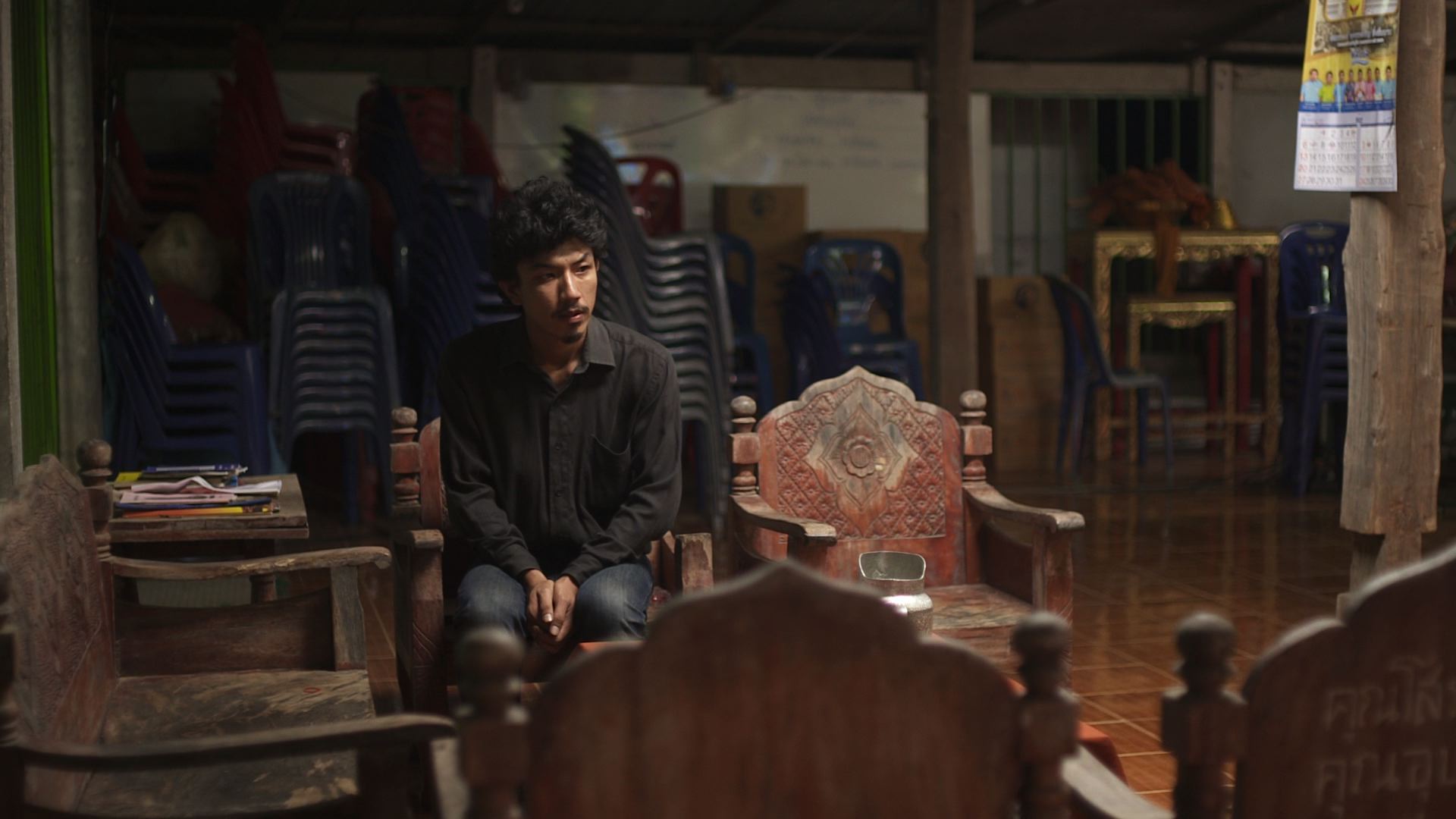
The Mother © Pimpaka Towira, Rent it here.
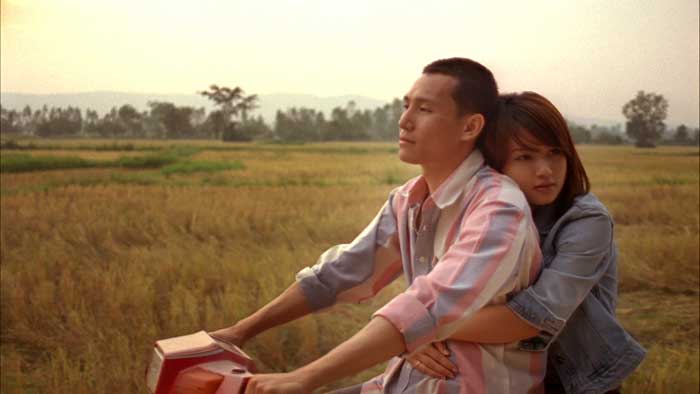
Terribly Happy © Pimpaka Towira, Rent it here.
Davy: It was just great to make that film. It was not shown anywhere after and I understood why, it was too gory and weird and nobody could really see the point. But for me, I think it was extremely important. Pimpaka mentioned earlier that towards the end of her film, the character is reborn, and I feel the same way as well; the character is reborn, but the filmmaker is also reborn as someone who is now ready to make a film.
It was necessary for me to make that film even though nobody watched it; it was something that I felt I had to do. We shot for two days, I raised 500 euro from 2 associations of mine to make the film. I was wondering if I could find someone with many pimples on the face, so I started to visit all these health forums and I found a lot of people who were concerned about their pimples, and I felt very connected to their pain! I managed to find my actor eventually. It took about one hour of makeup every morning and it was fun for me to play with makeup, which I had not done before. I’ve not played with aesthetics and makeup since.
Audience Member: Davy, to what extent do you believe all your Western influences have had on your later works dealing with uniquely Asian ideas?
Davy: Four of my films have been made in Cambodia. Cambodia is not the country where I grew up in. I first went there when I was 25 years old. But still, the main influences I had for my last films were mainly Asian because I also watch a lot of Asian films back in France, and was into modern Asian cinema from Hou Hsiao-Hsien, Tsai Ming Liang, Wong Kar Wai, to Apichatpong Weerasethakul. In my first short film, there are direct references to Wong and Tsai.
Having said that, when I showed Golden Slumbers in Taiwan in 2012, one of the artistic directors of the festival told me that although I mentioned I was influenced by Hou Hsiao-Hsien in the way I shot my film, the way I spoke about my films was so French. I was speechless, because maybe she’s right.
I guess the way I think first, structurally, is really influenced by the education that I received growing up in another country. Education can be so strong in the way of seeing things and constructing our thinking. In the case of Diamond Island, although it’s a very loose storyline, you can find a lot of Southeast Asian themes relating to the topics of the films of Lino Brocka in the 70s.
Audience Member: Pimpaka, you mentioned that you no longer have the 35mm print and the copy online is from a VHS tape. Do you have any thoughts on how circumstances under which films are shown may affect the viewing experience?
Pimpaka: The screening format can affect the viewing experience. I would prefer to screen it in film and in theatres, but it is quite difficult nowadays. My films can be quite challenging to watch on a small screen. It’s not only about the quality, but also the cinematic language. Sound is very important for me as well. Some films play well on a small screen, but some films present better on the big screen. It depends on the type of aesthetics that filmmakers would like the audience to achieve.
Audience Member: Pimpaka, you wanted to quit after the negative reception to Mae Nak. What made you continue?
Pimpaka: At that time in Thailand, we were not so accustomed to independent films and such films were new for the audience. Although I felt like a failure, having the film screened in Japan opened my eyes to new ways of thinking. From there, having the opportunity to make my first feature film opened up a path to working as an independent filmmaker. It also helped that from 1999 to 2000s, I was also part of a growing Thai film movement. Filmmakers like Apichatpong Weerasethakula, Pen-ek Ratanaruang and myself were getting recognition in Asia and abroad.
With hindsight, I shouldn’t have felt that I had to stop making films because I thought the audience didn’t like my film. If you can find a way to open your film to new audiences and new ways of filmmaking, there are other options out there. Believe in yourself and don’t give up!
Audience Member: Davy, I’m curious about the meaning of the pimples in your film, do they have a symbolic meaning?
Davy: Going back to my idea of movie influences, and how master filmmakers are a burden to you, such that you can’t feel liberated. So the only way is to get them out. This pimple is for Martin Scorsese, this pimple is for Wong Kar Wai, this is for Jean Luc Godard, and now I can be myself.
I caught myself recently thinking – all my films deal with one topic that actually, I never wanted to deal with – that of identity. I have to reflect on my own story of being born in France from Cambodian parents and returning to Cambodia to work there.
I wonder now if that attempt of the pimples, was unconsciously a quest for identity; that something inside me that doesn’t want to get out, and trying to find yourself by mutilating yourself to find your real face. And so the last shot of the film is the only shot that was in front of his face. In the end, he dared to look at himself in the mirror. He might look like a monster with full of blood, but at least he’s at peace and he dares to look at himself, which is also maybe me looking at myself.
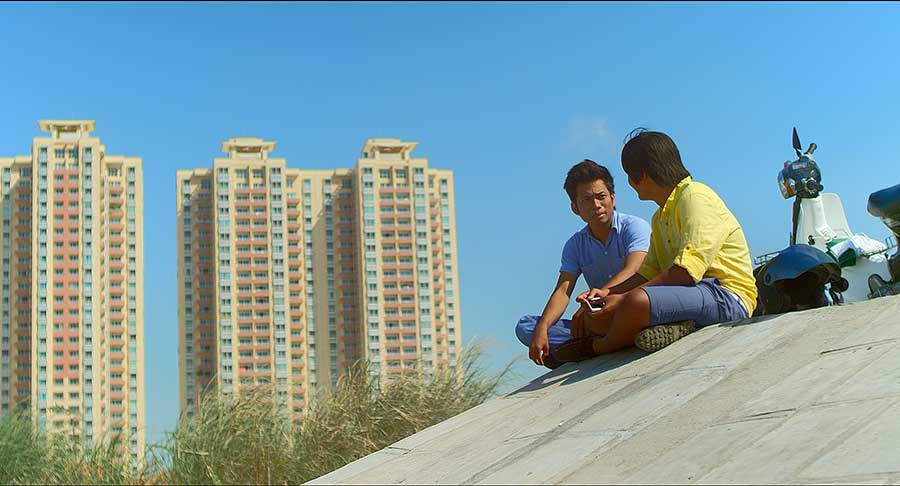
Cambodia 2099 © Davy Chou, Rent it here.
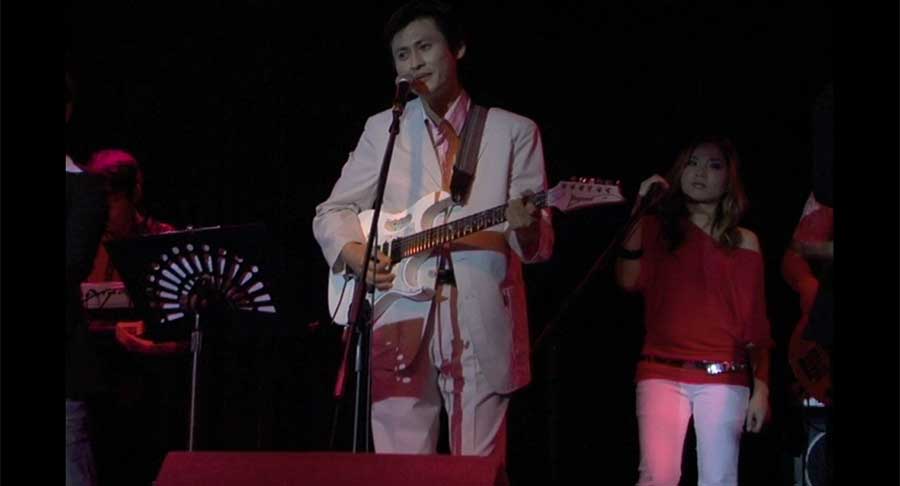
Expired © Davy Chou, Rent it here.
Audience Member: What advice do you have in making short films?
Davy: Short films for me are a space of freedom and experimentation. It’s not easy to make films, but it’s a little easier to make shorts because they cost less money. If you have a chance to make a short film, try not to feel pressurized about the results or feel the need to make a polished film.
I think the most attractive and surprising films are those that are so free to invent something that I haven’t seen before. It’s also important to be able to work with people you can trust, to experiment and to see if it’s exciting to work together. That’s a great way to learn, to know each other.
Audience Member: With the declining rate of cinema goers and the rise of streaming, what are your plans going forward as filmmakers?
Pimpaka: You should understand the platforms for your films, e.g. art house cinema or online streaming. I am also trying to find the right balance. While everyone is moving online, there are also many online platforms competing for attention. I’m currently working on a project with an online platform. I won’t reject it, and I would like to try and understand how it works.
Davy: Covid-19 has accelerated the decline in a dramatic way, and I am concerned. Not just as a director, but also a producer of films by younger directors in Cambodia with whom I am working. I am trying to finance my new film in Europe, but it is challenging.
What will be the future of independent cinema? There is no doubt that there will still be demand for content. But with streaming and online platforms, you are not just competing with other films, but also short audience attention spans, social media etc. Those who can adapt quickly and anticipate future changes will be successful. I’m not sure I can be that person. But I wish good luck to those who can adapt quickly!
Davy Chou’s First Film and Mae Nak, along with other short films by Davy Chou, Pimpaka Towira and other Southeast Asian filmmakers, are available to rent on the Objectifs Film Library.

